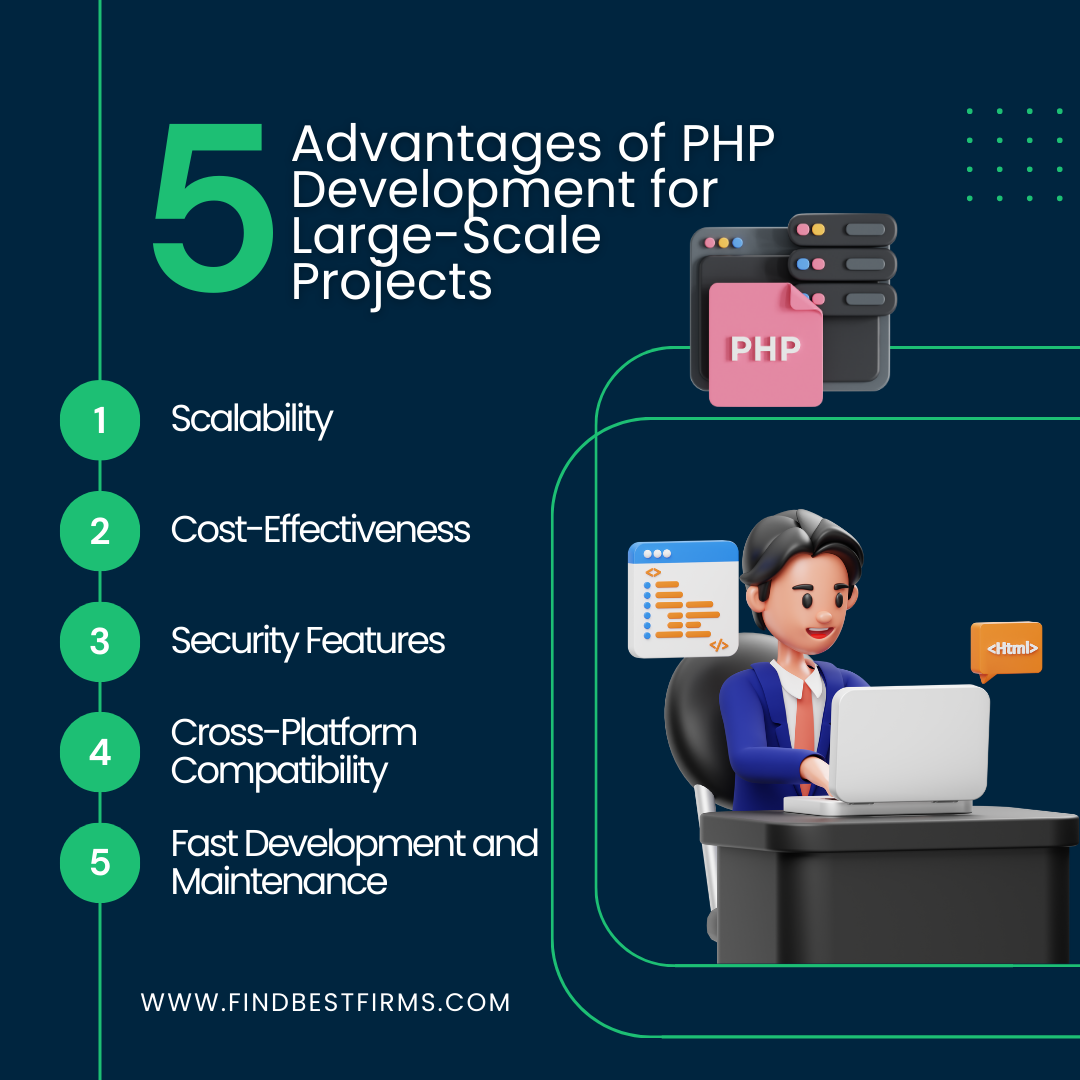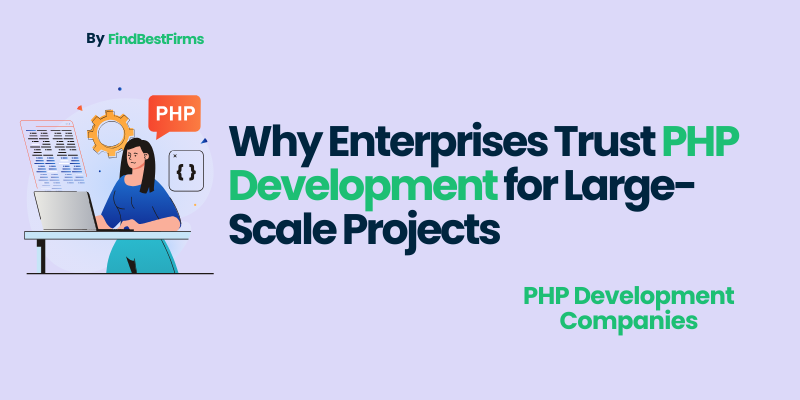The digital economy is evolving at a rapid pace, and enterprises are constantly searching for scalable and reliable technologies to power their web applications and support long-term growth. Even projects that process millions of user interactions, need to be secure and perform well, which is why big projects require an excellent technological foundation. One language that has withstood the test of time and remains one of the preferred languages is the PHP.
PHP is still a reliable choice of enterprises all over the world despite the introduction of newer technologies. Its flexibility, open source, and community support are some of its attributes that make it a good choice for businesses operating complex and large-scale applications. However, in this blog, we will understand why companies are confident to use PHP development on the most critical projects, and how the technology keeps progressing in 2025 and further.
The Growing Relevance of PHP in Enterprise Development
With almost 20 years of history in the web development environment, PHP remains one of the most popular programming languages to date, even after other new languages emerge. Although there might be critics who might think that PHP is an ageing language, the facts totally differ. As per the reports in the industry, PHP continues to run almost 75 % of all the sites on the web. This enormous figure not only illuminates its high use, but the fact that it is still relevant. Whether it is a small business site or large corporate software, PHP has proved to adapt to the changing requirements of technology and as such it is a sure bet that every organization can rely on.
Many of the most identifiable platforms in the world have been using PHP to develop and grow their online infrastructure. As an example, Facebook initially implemented PHP as the foundation of its system and allowed it to expand to become a social media giant serving millions of people globally. In spite of the fact that Facebook later tailored its stack to suit its own specific requirements, the fact that PHP played a key role in its success early on cannot be refuted. Equally, Wikipedia, which is one of the biggest pools of knowledge in the world, continues to be powered by PHP in order to handle its extensive and continuously growing pool of content. This real life scenario points out that PHP still has the reliability and the performance required by large scale platforms.
In addition to content-based sites, business-focused applications also rely on PHP to deal with high-performance websites. Slack, the most popular communication platform, and MailChimp, a marketing automation platform widely used, both deployed PHP in scaling their operations. This is understandable since PHP provides a tradeoff between scalability, performance and affordability to enterprises. This combination is an essential requirement of global businesses that have to deal with millions of users. Through the versatile design that is fast to develop, integrates without friction, and remains stable through time, PHP has remained the default technology of choice when enterprises need a combination of efficiency and innovation at scale.
5 Advantages of PHP Development for Large-Scale Projects

a) Scalability
Large enterprises often deal with unpredictable traffic surges. Whether it’s an eCommerce site during a holiday sale or a SaaS platform managing thousands of concurrent users, scalability is essential. PHP frameworks like Laravel and Symfony make scaling easier with modular architecture, caching, and load-balancing support.
b) Cost-Effectiveness
PHP is open-source, which means enterprises don’t need to pay hefty licensing fees. This alone makes it attractive compared to proprietary technologies. Additionally, there’s a vast pool of skilled PHP Developers available globally, ensuring businesses can scale their teams affordably.
c) Security Features
Security is non-negotiable for enterprise projects. PHP offers built-in security functions such as data encryption, input validation, and protection against threats like SQL injections or cross-site scripting. Frameworks also integrate advanced security patches, making enterprise applications more resilient.
d) Cross-Platform Compatibility
Enterprises operate across diverse ecosystems. PHP seamlessly runs on different operating systems Windows, Linux, and macOS while integrating smoothly with databases like MySQL, PostgreSQL, and MongoDB. This flexibility reduces infrastructure limitations and ensures enterprise-level agility.
e) Fast Development and Maintenance
With its wide range of libraries, frameworks, and pre-built modules, PHP accelerates development timelines. Enterprises benefit from quicker time-to-market, while maintenance remains manageable thanks to PHP’s readable code structure and active community-driven updates.
Popular PHP Frameworks That Support Enterprise Solutions
In business dealing with heavy-scale projects, the application is seldom created without the aid of frameworks. The PHP frameworks are strong enough to make a scalable, secure, and high-performing solution and simplify development. They provide off-the-shelf components, standard coding procedures, and effective tools that enhance the entire procedure, and as such, they are a critical component of web development when it comes to enterprises.
One of the most popular frameworks, Laravel is characterized by clean syntax, scalability, and an in-built set of features like authentication, caching, and API management, which makes it the framework of choice amongst developers. In the same manner, Symfony is a modular and flexible system, so it is ranked among the best frameworks to run enterprise-level applications and systems here, such as Drupal. CodeIgniter presents a lightweight but efficient solution that does not affect performance in projects in which speed and simplicity are relevant.
There is the Zend Framework (currently Laminas Project) which is another enterprise-oriented choice that specifically targets the high security and performance requirements. All these frameworks come with their own advantages to the table, yet, when combined they make development easier, minimize redundancy, and allow enterprises to develop robust applications to meet complex business requirements.
How PHP Development Supports Enterprise-Level Requirements
Enterprises no longer require a web site, they require a digital environment that can support massive operations, flexibly respond to changing needs, and be able to work closely with the tools they use everyday. This is where PHP shows its worth as it goes way beyond simple functionality of a web site to power and accuracy at the enterprise level.
High performance applications are one of the greatest strengths of PHP. Applications such as eCommerce shops, SaaS, or company portals may have millions of users on a daily basis. PHP frameworks can support such heavy loads without affecting the speed or user experience and this means that enterprises can keep up the performance despite traffic spikes.
Businesses also need tailored business logic to address their industry requirement. A healthcare provider may require a patient management solution with rigorous compliance guidelines whereas a financial institution may require complex transaction systems. The flexibility of PHP will enable developers to create such highly customised solutions, but without the excess complexity, and this will mean that businesses obtain technology that is perfectly suited to their operations.
There is also the fact that businesses flourish by being integrated. PHP is easy to use to interface the applications to third-party APIs, such as payment gateways and customer relationship management (CRM) systems, cloud services and analytics tools. Besides automating work, it makes businesses work as a harmonious data-driven organism.
Last but not least, the ability of PHP to operate with cloud-based infrastructure enables enterprises to scale without any form of effort. As an increasing demand arises, companies are able to scale their systems both regionally and across servers without compromising reliability and performance. PHP offers the perfect combination of stability, flexibility, and scalability that organizations with mission-critical operations are operating on to enable these organizations to compete in an ever-changing digital market.
The Future of PHP in Enterprise Web Development
PHP continues to evolve with each new release, adapting to modern enterprise needs while staying true to its core strengths. The arrival of PHP 8.x marked a major leap forward, introducing Just-In-Time (JIT) compilation, which dramatically improves execution speed for complex applications, and enhanced error handling, making large-scale systems more reliable and easier to maintain. These advancements have positioned PHP as not just a legacy tool but a modern language capable of handling today’s enterprise challenges.
Looking ahead, PHP is set to remain a cornerstone of digital transformation initiatives in large organizations, thanks to its ability to embrace emerging technologies and architectures:
- AI and Machine Learning Integrations – With the growing demand for intelligent business applications, PHP can now work seamlessly with APIs and libraries that support machine learning models. This enables enterprises to integrate features like predictive analytics, chatbots, and recommendation engines into their existing PHP-powered platforms.
- Cloud-Native Applications – PHP has proven to be highly adaptable in cloud environments, running effortlessly on major platforms like AWS, Microsoft Azure, and Google Cloud. Enterprises can now scale their PHP applications on-demand, optimize resources, and ensure high availability for global users.
- Microservices Architecture – Instead of building monolithic applications, enterprises are increasingly adopting microservices to create modular, flexible, and distributed systems. PHP frameworks support this architecture by allowing different services to communicate via APIs, making applications easier to scale and maintain.
With its ability to integrate seamlessly into modern IT ecosystems, PHP is far from being an outdated technology. On the contrary, it is gearing up for a stronger role in powering enterprise-grade innovations from intelligent applications and cloud-native deployments to modular architectures designed for long-term growth.
Choosing the right PHP development partner can feel like searching for a needle in a haystack. With so many companies out there promising big results, it’s tough to know who you can truly rely on.
FindBestFirms makes the process easier by connecting you with top PHP companies that have already proven their expertise. Whether you’re a startup building your first website or an enterprise looking for advanced, scalable solutions, you’ll find trusted partners without the stress of endless searching.
Instead of spending hours comparing options, you get quick access to skilled PHP developers and agencies with a solid track record. Each company on FindBestFirms is carefully reviewed for experience, client satisfaction, and performance, so you can feel confident in your choice.
It’s your shortcut to finding PHP experts who actually deliver. If you want to save time, reduce risks, and work with professionals who understand your business goals, FindBestFirms is the right place to start.
PHP has come out to prove useful several times when it comes to large-scale enterprise projects. Whether it is the need to drive one of the largest platforms in the world or give businesses scalable, secure and cost-effective solutions, PHP has continued to be a reliable option.
To businesses, using PHP would mean using a future proof technology that is reliable and innovative. Through the collaboration with the professionals in PHP Developers or an Top PHP Development Company, companies can establish applications with the highest degree of reliability to withstand the heavy traffic, support complex features and be a long-term growth-de driver.
Enduring through the years in 2025 and beyond, PHP is not only surviving its flourishing as a backbone of enterprise web development.

